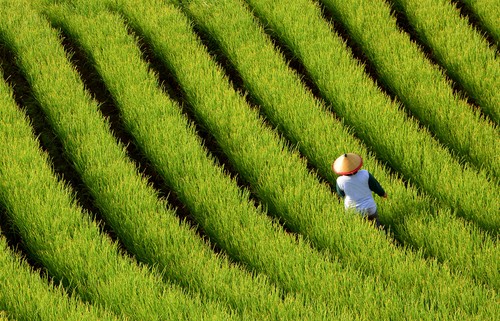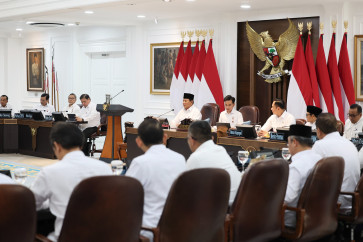Popular Reads
Top Results
Can't find what you're looking for?
View all search resultsPopular Reads
Top Results
Can't find what you're looking for?
View all search resultsRethinking women's role as 'invisible' farmers
Women’s role in shaping agriculture nowadays needs to be taken into account. According to the 2013 census Indonesia has 7.4 million female farmers, exceeding the current population of Hong Kong itself. These women mostly reside in rural areas and usually live under the poverty line.
Change text size
Gift Premium Articles
to Anyone
A
boy seemed in rather a hurry while riding his bicycle along the road of bushy Ulu Simbune, a large farming area situated between two small villages of Simbune and Lalingato in Southeast Sulawesi.
Sundays, for him, were always intense days of work on his family’s cocoa farms. It can take up to eight hours, usually from 6 a.m. or 7 a.m. in the morning to 2 p.m. in the afternoon, to cut the overgrown wild grass and spray the cocoa trees with pesticides, both long-time practices among farmers in the area. Unknown pests had apparently damaged the surrounding plants, causing losses during the harvest period.
The boy was not alone doing all the work. His mother and elder brother arrived first at the farm. Raising her children alone after a severe kidney tumor took the life of the breadwinner of the family, the boy’s mother had no choice but to actively participate in farming. Money from the farm has now become one of the primary sources of income in her family, besides her salary as a full-time elementary school teacher.
(Read also: Empowering women, empowering the national economy)
Considering my real experience above, female farmers who live in villages or smaller regions in both developing and underdeveloped countries is not a new phenomenon. As a matter of fact, women in the villages mentioned are considered to have crucial role in supporting their families’ needs by contributing their energy to the so-called male-only work of farming.
Not only are these housewives responsible for preparing meals for their kids for school, they are also full-time farmers, though rather invisible ones. This means that women do not have the same opportunities as men when it comes to agricultural processes. In land use issues, for instance, men are still the decision makers and rice tractors are typically operated by men. Women’s status is no more than a labor that helps the men do their job.
Women’s role in shaping agriculture nowadays needs to be taken into account. According to the 2013 census Indonesia has 7.4 million female farmers, exceeding the current population of Hong Kong itself. These women mostly reside in rural areas and usually live under the poverty line.
It is also common that Indonesian women living in small regions have more opportunities to be farmers than those living in larger areas. This, however, does not summarize their significant interest in agriculture compared to men’s -- sometimes they simply have no choice but to help their family and work on the farms as was detailed in the story beforehand. However, it is noteworthy that the contribution made by the boy’s mother does not solely reflect an effort to fulfill her family’s needs, nor it is simply her destiny after her husband passed away, leaving her a big responsibility to continue maintaining their existing agricultural land.
(Read also: What it means to be a modern-day Kartini)
Despite this situation, women do have an interest in agriculture probably as much as men do. In 2014, around 564 million women are active agricultural laborers as stated by National Geographic. In addition, Food Tank has recently published its 25 most influential women in food and agriculture list about women whose initiatives and projects have changed our perspective on women and their influence in this domain. They are entrepreneurs, farmers, and researchers with a passion for creating sustainable agriculture. This is a conclusive proof that women, after all, are able to be successful farmers and that they need to be given what it takes to be farmer, e.g access land ownership, financial supports, agricultural education and so on. We must see women as co-workers for men in improving the world’s agriculture.
However, as this may seem like a turning point of women’s involvement in agriculture, the term “feminisation” of farming is no joke. Many still believe than farming is not feminine work, thus women are not encouraged and get very limited access to participate in agricultural processes.
***
Sujardin Syarifuddin, 26, is an Indonesian who is currently in his second year of graduate study in Applied Linguistics at the University of New South Wales, Sydney, Australia. He co-founded MorBi+, a newly established startup which produces Moringa-based products. He is also a member of BCFN (Barilla Centre for Food and Nutrition) Alumni Association. His Facebook account can be found at https://www.facebook.com/sujar
---------------
Interested to write for Youth channel at thejakartapost.com? We are looking for information and opinions from students with appropriate writing skills. The content must be original on the following topics: passion, leadership, school, lifestyle ( beauty, fashion, food ), entertainment, science & technology, health, social media, and sports. Send your piece to community@jakpost.com, subject: YOUTH. For more information click here.







